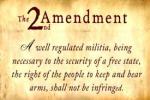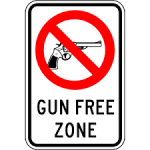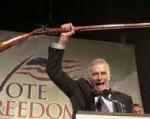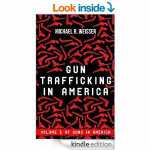One of the reasons often advanced to explain the success of the NRA in promoting pro-gun attitudes and laws is something known as the “intensity gap.” According to this argument, the NRA wins because their supporters are more committed, more dedicated and more fiercely loyal to the organization and its goals, as opposed to the GVP movement whose supporters are only driven to express their support for more gun control after a mass shooting or other high-profile violence involving guns.
The latest iteration of this argument is the handiwork of Professor Gary Gutting, whose op-ed appeared today in The New York Times. Gutting, who teaches philosophy at Notre Dame, claims that the GVP movement should borrow the energies and viewpoints of recent anti-racist efforts like Black Lives Matter who have successfully enlisted black and white support by pointing out the basically racist nature of police (and civilian) shootings of inner-city blacks. He further argues that white antipathy towards racism would counteract the intensity that gun owners exhibit whenever they feel that the 2nd Amendment is being attacked, an intensity based on America’s fear of ‘tyranny’ which explains the strong support for 2-A rights.
Gutting may or may not be correct in asserting that Black Lives Matter has tapped into a concern held by white liberals about violence and racism directed at blacks, but his attempt to build a case for the NRA’s anti-tyranny argument through support of the 2nd Amendment is just dead wrong. The NRA doesn’t promote itself as an anti-tyranny organization pari passu, it promotes the anti-government position only when the government is in the hands of what Fox News calls ‘the Left.’ Ever hear Dana Loesch, Sarah Palin, Wayne LaPierre or any other pro-gun noisemaker talk about the gun-control law that Governor Ronald Reagan signed that mandated, among other things, a fifteen-day waiting period for the purchase of handguns in the Golden State?
Know which members of Congress voted against GCA68? Virtually the same southern federal office-holders who voted against GCA68 also voted against the Voting Rights Act of 1965. And they voted the same way for the same reason: both were instances in which Northern liberals passed laws to teach Southern whites how to behave. If anyone believes that the current opposition to gun control is anything other than a reprise of the conservative-liberal battle over states’ rights as it originally played out during the struggle over civil rights, think again. The NRA can tell you that gun control today leads to gun confiscation tomorrow, but from 1939 (Miller v. United States) until 2008 (District of Columbia v. Heller) we had plenty of liberals running the federal government and passing gun-control laws. Meanwhile, not a single gun was ever confiscated from a law-abiding gun owner. Not once.
 I’m also confused, frankly, by Gutting’s pronouncement that the GVP movement lacks the intensity that’s found among followers of the NRA. That’s a rather shop warn view of things lately owing largely to a bunch of street-wise, energetic and savvy woman both in leadership and grass-roots positions who have levelled the advocacy playing field to a degree not previously seen. If there’s an intensity gap about gun violence nowadays, I perceive it more as a gender gap within the GVP movement itself. But as in so many other things, the men (like myself) tend to sit back, watch the sports on a widescreen, pop a few tops and let the women do the work.
I’m also confused, frankly, by Gutting’s pronouncement that the GVP movement lacks the intensity that’s found among followers of the NRA. That’s a rather shop warn view of things lately owing largely to a bunch of street-wise, energetic and savvy woman both in leadership and grass-roots positions who have levelled the advocacy playing field to a degree not previously seen. If there’s an intensity gap about gun violence nowadays, I perceive it more as a gender gap within the GVP movement itself. But as in so many other things, the men (like myself) tend to sit back, watch the sports on a widescreen, pop a few tops and let the women do the work.
What moved America on civil rights were pictures of blacks being hosed, beaten or worse when they sat at segregated lunch counters, enrolled in all-white schools or stood fast against Sheriff Connor at the Selma Bridge. What has moved Americans to rally against gun violence is the carnage at San Bernardino, Umpqua and Sandy Hook. Racism and gun violence are cut from the same cloth. There’s no reason why we need to borrow the outrage against one to be outraged at the other.






Recent Comments